Magnificent, enthralling, bewitching and captivating – just some of the words that can be used to describe the breath-taking beauty that is St Kilda and its stunning archipelago.
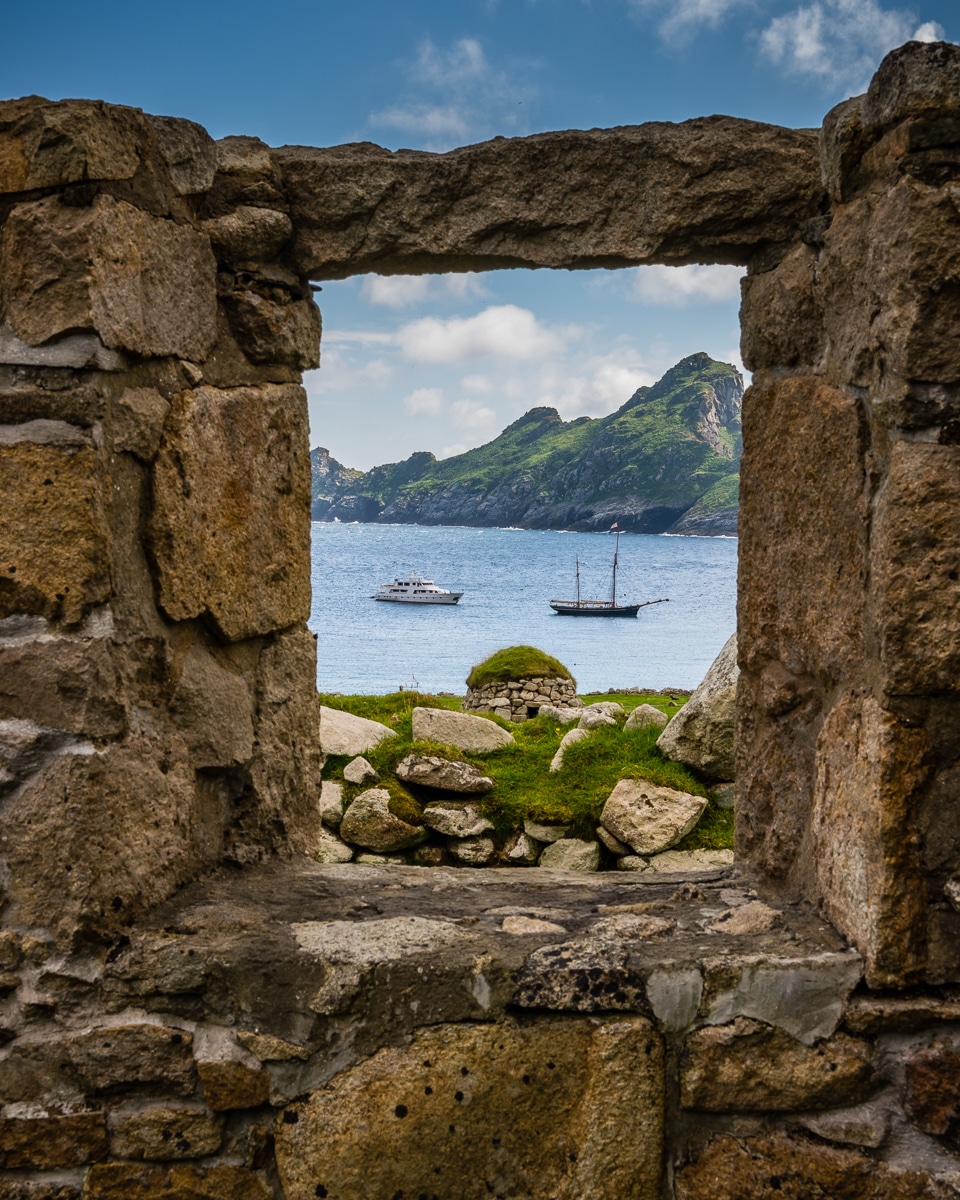
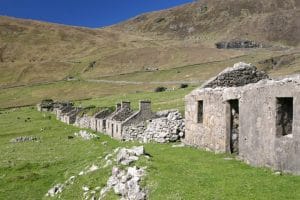
A World Heritage Site and a Site of Special Scientific Interest, the rock formations reaching out from the sea are the home to the islands world famous inhabitants – the puffins and our visit here is truly the highlight of this cruise. However, the journey to St Kilda will never disappoint as we depart from beautiful Oban, through the scenic Sound of Mull and past the bird paradise which is Canna. We visit the Isle of Barra with its turquoise waters lapping up white sandy beaches and Kisimul Castle which appears to float majestically in these waters.
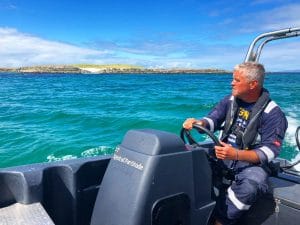
We sail on to the islands of North and South Uist, where Bonnie Prince Charlie first set foot on Scottish soil and on our return from St Kilda, we visit Harris and Lewis – passing monumental sea stacks, heavenly beaches and remote islands before reaching the impressive Isle of Skye. Sailing back down the west coast, we will see picture postcard villages, hidden bays and the best wildlife that Scotland has to offer.
Passing places, anchorages and ports
Oban
Our gateway to the highlands and islands ……. Historically a fishing and trading village until the Victorian steamers started arriving in larger numbers to this pretty village, Oban grew into a town as it became a main stopping off point for the Western Isles.
Mull
With over 300 miles of beach and coastline, the sights that you will see here will blow you away. Standing on the most southernmost tip of the Kintyre peninsular on a clear day you can see the coast of Northern Ireland in the distance.
Mull is well known for its hills and its Munro – Ben More stands at over 3,169ft and is popular with climbers and there are many beautiful walks and climbs throughout the island. Mull has been inhabited since the last ice age and the island is dotted with bronze age stone circles and standing stones and the iron age is demonstrated through crannogs and fortified duns. Duart castle is a magnificent example of medieval architecture and more recent examples of Scotlands’ clans and castle history lies at Torosay and Glengorm.
The island has a rich abundance of wildlife and otters and golden eagles are easily seen as well as occasional sightings of the white tailed eagles. Red and roe der can also be found throughout the grass and woodland.
Locals produce some wonderful produce – chocolate, cheese, smoked salmon and of course its own whisky.
.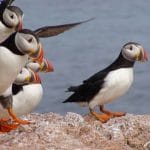
Tobermory
A picture perfect setting of coloured buildings down to the pier surrounded by wooded hills around the bay up to the lighthouse with its playful otters among the rocks. At the bottom of the bay is thought to remain the wreck of a Spanish galleon which fled the English fleet when she anchored in Tobermory to take on provisions. Following a dispute over payment the ship caught fire which caused the gunpowder to explode. She was supposed to have been carrying millions of gold coins when she went to the bottom but no-one has ever managed to find any significant treasure. Tobermory also has its very own chocolate factory.
Isle of Canna
The most westerly of the Small Isles and measuring just five miles by one, it is now owned by the National Trust for Scotland and is a working farm. The main harbour, which is thought to be the best of any of the Small Isles lies between Canna and the linked island of Sanday. The sky is a playground for sea eagles, golden eagles and puffins as well as peregrine falcons and merlins. On the north coast is the grave of the King of Norway at Rubha Langan-innis. John and Margaret Campbell both lived on this Isle for many years and they collected a great history of its people, with a large collection now of its traditional songs all in the Gael, folklore and the many customs which are not to be seen in the Isles today. It is great that this long heritage will not be forgotten.
Barra
As a family we have visited this amazing little place many times with its beautiful beaches, machair, hills and moors. It really is a magical place to while away an afternoon. The most southerly of the inhabited islands of the Outer Hebridies, it is a perfect combination of stunning scenery and history in one perfect location. We sail past the medieval “Castle in the Sea” – Kisimul Castle (which was leased by Clan MacNeil to Historic Scotland for 1000 years for £1 a year and a bottle of whisky) to one of the many secluded sandy bays although watch out for planes as they land between tides on the beach at Cockle Strand. Visit the ancient graveyard of Cille Bharra and its ruins of the medieval church or spot one of the other ruins that are scattered around the island.
Barra and Kisimul Castle
Kisimul Castle in Castle Bay on Barra is a 15th century castle that was home to the Macneil. Famed for their sea faring adventures, one Macneil pushed the boat a little too far and was arrested for piracy of an English ship late on in the 16th century. Now in the care of Historic Scotland, the castle has been lovingly restored in part and the tower house battlements offer spectacular panoramic views around Castle Bay. Sitting in the sea with its prime position this is a proud and captivating Castle.
Eriskay & South Uist
It was on the beach at Eriskay that Bonnie Prince Charlie first set foot on Scotland’s fertile shores in 1745. The beach is home to beautiful white-striped, pink sea bindweed of which the seeds are said to have fallen from the Princes pocket when he landed as it is not native to the Hebrides. The beach today is as beautiful as it was then and when you stand on the white beaches gazing out to the sea, you can easily resonate with the Bonny Princes words – “I am come home sir”. It is also the home of the Eriskay pony, a smallish but very sturdy and hardy breed of pony.
Compton Mackenzie’s bestselling 1947 novel “Whisky Galore” based on the story of the SS Politician which struck rocks of the island in 1941 and spilled a large number of its 264,000 bottles of whisky. Thousands were “liberated by the island folk before officials turned up and searched the island to retrieve the bounty as they did not have Tax on them. Today you can get a glimpse – although not a taste – of some of the few remaining bottles that were saved by the peat that they sunk into.
South Uist is home to the oldest golf course in the Outer Hebrides – Askernish which offers phenomenal views whilst taking in a round of golf. Like many of the Western isles it is an island of two halves – the east is dominated by mountains and the west is made of long lines of sandy beaches. Along the coast are the remains of a 12th century castle and on the west is the Hill of the Miracles, which in 1957 saw the erection of Hew Lorimer’s 30ft statue of the Madonna and Child, “Our Lady of the Isles”, on its slopes.
Benbecula & North Uist
Benbecula in Gaelic, is Beinn na Faoghla which means Mountain of the Ford. This is a very apt name for the island with its seemingly infinite fords and its solitary hill, Rueval, which looks over the Bonnie Prince Charlie trail which the Young Pretender once followed as he made good his escape from the Red Coat Army following the bloody Battle of Culloden.
There is an intoxicating atmosphere here, you can’t help but feel a pulling to the past with its legends in this isolated location. It is also home to Scotland’s oldest University, older than St Andrews by nearly 200-years though not now standing, the ruins are the remains of a medieval college and monastery. Nearby sits the ruins of Borve Castle where the chiefs of the Clanranald sheltered as well as the now ruined temple to St Columba. The island also is home to a 5,000-year-old burial chamber and the stone circle called Finn’s People, one of the finest on the island.
With a splendid mixture of fresh and salt water lochs adorned with miles of white sandy beaches, this area is a paradise for birdwatchers and animal lovers alike. A unique opportunity is had to see the only short eared owl that appears in daylight and the ghostly white hen harrier swooping gracefully down to capture its prey. Witness otters as their families’ frolic or better still the elusive grey and brown corncrake one of Europe’s most endangered species, as it sings for the evening serenade. Machair dresses the beaches where wading birds nest and leads to the RSPB Nature Reserve.
St Kilda
Your imagination and heart cannot help but be captivated by this location, with its amazing and tragic stories many of which demonstrate the power of the human spirit and its quest to survive.
For centuries the St Kilda clutch of islands was under Clan MacLeod and their traditions included that no man could marry until he could weave a rope out of horsehair so that he could maintain his wife by climbing to hunt the seabirds who live on the cliffs. At one time it was estimated that each person on St Kilda ate 115 fulmars every year. And in 1876 it was said that the islanders took 89,600 puffins for food and feathers.
Today, St Kilda is the UK’s only UNESCO Dual World Heritage Site and National Nature Reserve and one of only 29 global locations to be awarded World Heritage Status for both natural and cultural significance – putting it on a par with Machu Picchu and Mount Athos
These archipelagos with their exceptional cliffs and sea stacks, are rich in wildlife and form the most important seabird breeding station in north-west Europe. The cliffs of St Kilda are home to an estimated 1 million sea birds including puffin, fulmar, gannet, shearwater, petrel, kittiwake and shags. It truly feels like you are on the edge of the world.
St Kilda is one of the best places in Britain for diving because of its clear water and its submerged caves, tunnels and arches – all of which give the diver a rich experiences of the marine life on offer.
The tragic evacuation of this island in 1930 has meant that St Kilda has one of the most extensive groups of vernacular building remains in Britain. The layout of the 19th-century village remains to this day and the story of the evacuation and the build up to it brings a shiver to the listener. As you walk through the abandoned village and houses left in mid flow, you expect to hear echoes of the everyday life that they left behind.
The legends, stories and folklore of St Kilda are plenty and here are just a few of our favourites:
Lover’s Stone
Before the young men of St Kilda could marry, they had to prove they were able to provide for a family by climbing the rocks to catch birds for food to test their agility, balance and patience. They had to balance on their left foot over the iconic edge of the protruding rock, place their right foot in front, bend down and make a fist over their feet. This demonstration would show that they could hunt and thus feed a family before getting into a position of having a family to feed and no way of feeding them!
The mailboat
The first mailboat was sent out as a distress signal in time of famine by John Sands, a journalist, who was stranded on St Kilda during winter of 1876. A small wooden ‘boat’, containing a letter, usually sealed in a cocoa tin whilst a sheep’s bladder acts as a float. A St Kilda mailboat is sent by St Kilda work parties as part of the ritual of visiting St Kilda. They are carried by the Gulf Stream and can reach far off places such as Scandinavia. You will have the chance to send your very own mailboat, courtesy of The Royal Scottish Shipping Line.
Village Bay, Hirta
Smallpox Epidemic
After visiting Harris in 1726 a St Kildan caught smallpox and died from it. His clothes were returned home to St Kilda in 1727, but these inadvertently brought the disease with them. Killing most of the Islanders, only one adult and 18 children survived the outbreak on Hirta. However, three men and eight boys managed to escape the disease as they had been left on Stac an Armin with no means of transport back, to collect gannets. There was no one left to fetch them back. They were eventually rescued by the Steward an amazing nine months later!
The Lady Grange
Formerly the wife of the Scottish Advocate, after separating from him, she spread vicious rumours of him being a Jacobite sympathiser. In revenge he imprisoned her on St Kilda in 1734. Eventually she managed to alert friends to her circumstances and they rescued her before taking her to the Isle of Skye where she died in 1742. A large cleit in the Village is traditionally said to be the house where she was held prisoner.
The Great Auk
The Great Auk, – Scotlands’ equivalent to the Dodo was once a familiar sight to sailors in the North Atlantic and was a frequent visitor to St Kilda before becoming extinct in 1844.
Harris
Sitting at the North West corner of the Western Isles, Harris is actually joined to the Isle of Lewis. Home to the ferry boat to Harris. To the west of the island are some of the most tantalisingly inviting beaches framed by sandy machair dunes whilst the north couldn’t be more in contrast with its rugged, treacherous and mountainous terrain. The isolated east coast has some of the oldest rocks in the world and these 3,000 million years old rocks help to form the islands many bays. To me, this is one of the purest places on earth with beaches of white sparkling sand and the sea that looks amazing in any light.
Not surprisingly, this beautiful coast was used to film the BBC Series Castaway 200. At the southern tip of Harris lies the 16th Century church of St Clement. Designed by Alasdair Crotach so named for the word meaning hunchback from a sword injury, the church boasts three tombs carved in almost striped black gneiss depicting knights. For the brave, a steep climb up almost vertical spiralling steps offers an amazing view of the island. This island is full of pretty little houses and famed for its collection of Harris Tweed shops, selling the Isles own produced Tweed – perfect for that authentic gift from the Gaels.
Lewis
When stepping ashore, you feel as if you live in a world of beautiful contradictions as you view ancient stone circles alongside the modern way of life and hear a mix of both Gaelic and English both spoken with ease.
This landscape comes to a dramatic climax at the Butt of Lewis where these imposing cliffs are home to kittiwakes, shags and black guillemots. Southwest Lewis has some beautiful beaches and the Uig hills, home to red deer and several pairs of breeding golden eagles. Further along you will find the sea stacks at Mangersta, what looks like a range of high peaked mini mountains pushing their way up from the sea. It is a bird lover’s paradise with redshank, greenshank, oystercatchers, curlew, ringed plover, dunlin, shel ducks, red-breasted merganser and merlins can be seen speeding over the moor in pursuit of meadow pipit or wheatear.
Stornoway
The largest town in the Outer Hebrides, is home to a population of around 8,000 over half of whom speak Gaelic. Until recently, the Sabbath was strictly observed with ferries only starting to run in 2009.
The town has a strong Viking history and due to its natural sheltered harbour it grew rapidly and was a natural stopping off point for travellers to and from the mainland. Tragedy struck in 1919 though when the Lolaire sank at the entrance to the harbour – killing over 200 men who were returning safely from the war in 1919.
The town is also home to Lews Castle which has just undergone a major reconstruction and houses a museum
Shiant Islands
The Shiants have one of the largest puffin colonies in the world – around 240,000 nest among the cliffs here every year, add to that the tens of thousands of guillemots, razorbills, the thousands of fulmars and kittiwakes and shags and this has to be the greatest place to watch birds in the world.
Isle of Skye
The stunning approach to the Isle of Skye and its impressive black Cuillin hills and their dramatic backdrop offers spectacular scenes of beauty from every angle. Skye is one of the most magical and beautiful places to visit from the sea with its mystical Fairy Rock Pools, and its famed Old Man of Storr, an impressive 165ft high column of rock along with its Coral beach to name just a few of the worthy sights
The remains of the headland fortress of Duntulm Castle perfectly frame the view from the tip of the Trotternish peninsula and further south lies the intriguing Kilvaxter Souterrain. To the North West lie two further peninsulas, Duirinish and Waternish – both worthy of exploration for both their beauty and also the ruin of Trumpan Church which is famous for “The Battle of the Spoiling of the Dyke”.
Tokavaig on the coast sits on a small pebbly beach under the watchful eye of the ruins of Dunscaith Castle. Legends tell that the original castle was built in a single night with the help of a witch. This headland was also said to have been the location for the legendary “School for Heroes” run by the Celtic warrior queen, Scáthach, whose name is reflected in that of the castle.
Applecross
Meaning “The Sanctuary” in Gaelic the area is extremely isolated yet beautiful. Applecross was only accessible by boat until the early 20th century and today it is a very popular place to visit. Historically, the settlement is linked with St. Máelrubai, a monk who came to Scotland in 671AD from the major Irish monastery. He founded Aporcrosanin 672 in what was then dangerous Pictish territory. The early monastery is located around the site of newer parish church built in 1817. A large, unfinished cross-slab standing in the churchyard and three extremely finely carved fragments of another preserved within the church are evidence of the early monastery.
Kyles of Lochalsh
The gateway to the Isle of Skye. Lochalsh village has some beautiful whitewashed cottages that you can see from the water and fantastic views of the world famous Skye Bridge and the Cuillin Range. The surrounding landscape is a haven for deer – both red and roe, as well as golden eagles and otters.
The Small Isles
Just south of the Isle of Skye lies an archipelago of four small islands – Eigg, Canna, Rum and Muck. Made up of a column of lava, Eigg has a bloodthirsty history of clan rivalry that ended in the death of the islands entire population. Rum is a national nature reserve and is one of Britain’s last wildernesses and is home to the Manx Shearwater that glides straight winged along the surface of the surrounding coast. On the smallest island Muck, a dagger and a number of burial cairns have been found which date back to the Bronze Age whilst thanks to the Gulf Stream its waters support a number of rare crabs, small purple sea urchins, and the only British Coral, the “Cup Coral”. Canna is the archetype of Hebridean islands and displays, evidence of the once great volcanic forces which have been at work in the earth’s crust. Wildlife is abundant here both on land and sea.
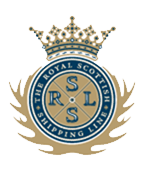
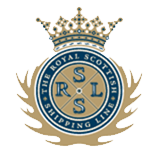
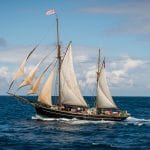
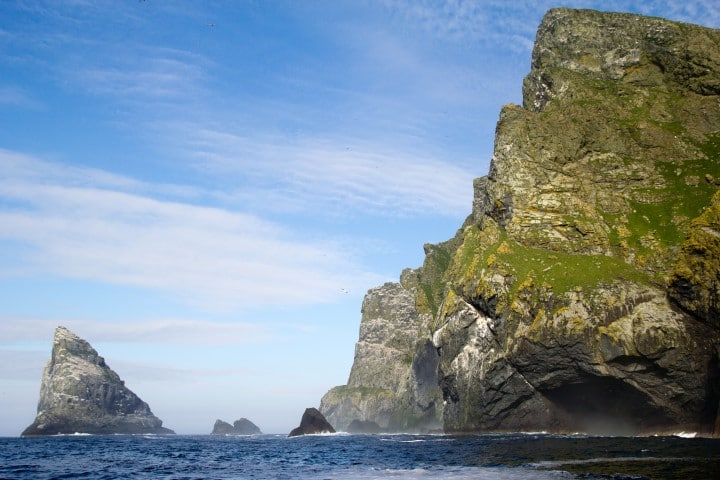
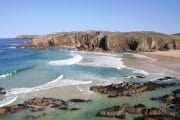
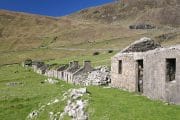
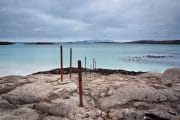
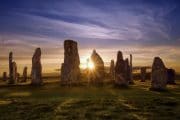
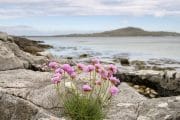
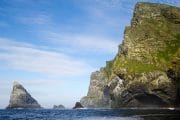
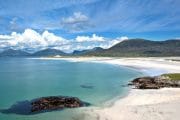
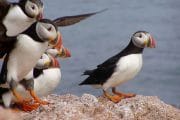
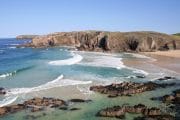
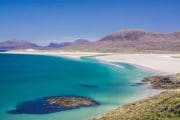
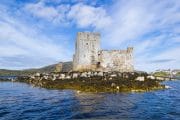
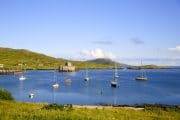
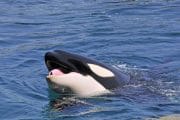
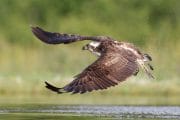
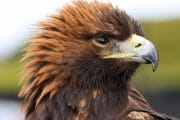
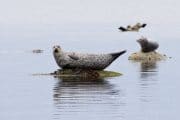
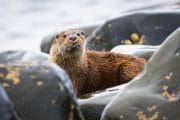
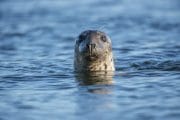
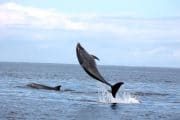
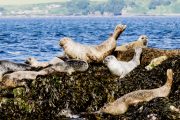
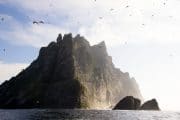
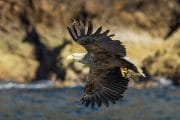
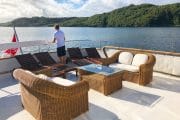
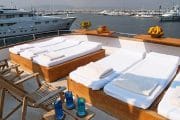
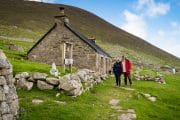
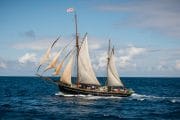
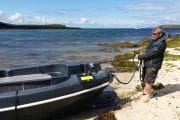
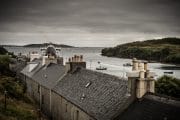
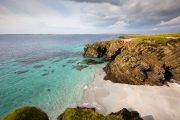
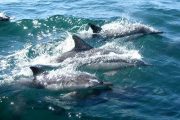
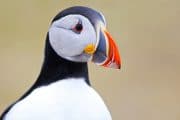
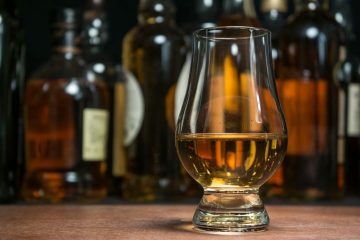
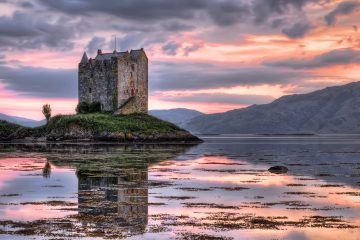
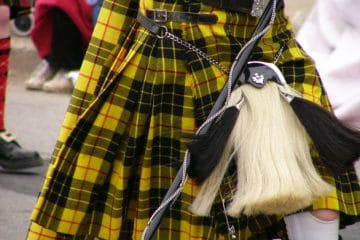
Tour Reviews
I loved this cruise! The booking process was simple and the staff very helpful, we got some great weather which was also a bonus. One less item on the bucket list!
Just fantastic cruise, wonderful scenery, friendly ports, most helpful and pleasant crew and the most gorgeous food have ever tasted. Most of the food was local sourced. The yacht is very comfortable, clean and spacious. Would highly recommend.
Thank you very much for a wonderful trip and an experience we will never forget.
We just wanted to let you know how really wonderful our cruise of the Western Isles was and how much we enjoyed it all. The Spirit of Fortitude was absolutely luxurious and the scenery more splendid than we had ever imagined but we reserve an even higher praise for the terrific crew you have put together. They looked after us every step of the way, nothing was too much bother and the food was outstanding. When we said goodbye on Tuesday it was like farewelling friends.
Nothing was too much trouble; all crew were attentive and friendly. We were looked after both professionally as well as with great care. Chef provided a string of excellent meals along the whole trip. Craig and Mark did all they could to keep us safe and help us enjoy our time aboard and ashore.
The captain did everything with good humour, and successfully traveled though the night to ensure we arrived at St Kilda, which was most memorable. Our cabin was very comfortable with great storage space and the overall public spaces where very superior as well as comfortable. We would rate the whole experience excellent and would not hesitate to recommend to our friends.
Captain was highly committed to getting us to St Kilda. The crew as well as having high regard for our safety also spent a lot of time pointing out various places and the wildlife. This was all topped off of course with the high quality of meals and vert well balanced. The overall areas within the boat were of very good quality with ample space, we would recommend this trip to our friends.
Our Captain did an excellent job in sometimes difficult conditions with regards to the weather. The crew were always helpful and seemed to have everything under control. Our steward was charming and very hard working and does a great job in the table settings. Everyone enjoyed Chef’s food, he was also very diligent with food allergies which we so appreciated.
Everyone was extremely warm, friendly and helpful. The vessel was great! Both inside and out with good windows upstairs and very elegant decor. We found our cabin incredibly comfortable with lots of space for clothing etc. We both very much enjoyed the holiday with the highlight being St Kilda as well as the other guests and crew.
Leave a Review